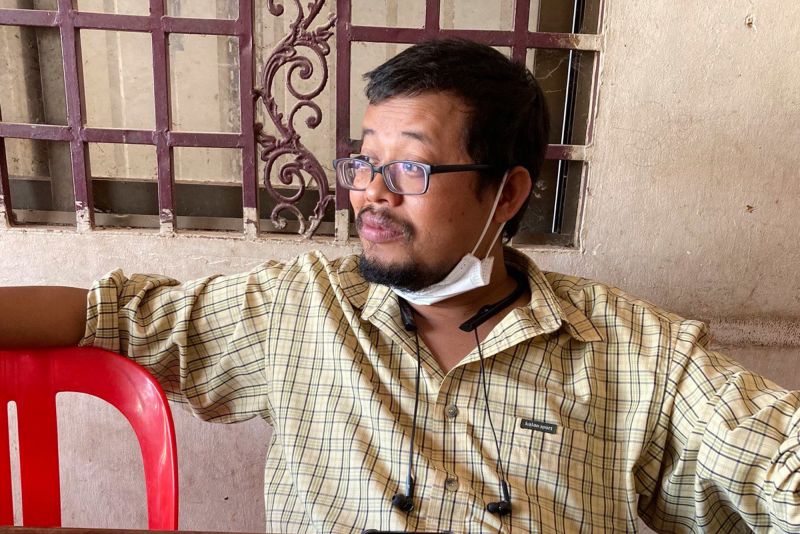International concern is growing over the arrest of a prominent Cambodian journalist who helped expose human trafficking fueling online scam centers, with several governments and rights groups calling for his immediate release.
Mech Dara was arrested Monday by Cambodian police and charged with incitement “to provoke serious social chaos” over social media posts he made last month about operations at a rock quarry, according to a statement from the Phnom Penh Municipal Court in the country’s capital. He could face two years in prison for each count.
The award-winning reporter is renowned for his investigations exposing corruption, environmental destruction and human trafficking in a country that heavily restricts press freedom. Cambodian NGO LICADHO said he has consistently pushed for accountability and justice.
In 2023, Mech Dara won the US State Department’s TIP Hero Award for his work uncovering the multi-billion-dollar illegal scam center industry in Cambodia. Images show him standing alongside US Secretary of State Antony Blinken, who presented the award.
In a statement on X, the US Embassy in Cambodia said “we are deeply troubled by the arrest of Mech Dara and call for his release.” The embassy called the reporter a “leading voice against human trafficking and online scams” and an “advocate for freedom of expression-guaranteed in the constitution.”
The USAID Cambodia Counter Trafficking in Persons project said Mech Dara “is the embodiment of the ideals of a free society in Cambodia” and that it “stands publicly in its support for this great person and anti-trafficking hero.”
The European Union and Australia also shared concerns over his arrest. “All Cambodians should be able to exercise their right to freedom of expression without the fear of arrest and prosecution,” the Australian embassy in Cambodia said.
A group of 46 Cambodian media and civil society organizations called for Mech Dara’s immediate release, saying his arrest “is a clear attempt to intimidate and silence him and other journalists.”
Human rights groups have said charges of incitement are commonly used by Cambodian authorities against human rights defenders, activists, journalists and government critics.
Southeast Asia’s scam operations
A major focus of Mech Dara’s work is Cambodia’s role at the center of a scamming epidemic in Southeast Asia that has ensnared hundreds of thousands of victims and raised global security concerns from bodies like the US State Department and the United Nations.
Many people across Asia are duped into seemingly legitimate jobs around the region and are then trafficked into scam compounds where they face serious abuse, including forced labor, arbitrary detention, degrading treatment or torture – often with minimal or no help from local authorities.
Forming the epicenter of this network is Cambodia, Myanmar and Laos, according to the US Institute of Peace and law enforcement bodies. The UN says 100,000 people could be held in compounds across Cambodia with another 120,000 people held in Myanmar in conditions that amount to modern slavery.
From these compounds, the mainly Chinese-run transnational criminal gangs run lucrative online operations ranging from illegal gambling to love scams and crypto fraud. Victims are from around the world, including the US.
In Cambodia, the industry is worth $12.8 billion annually – equivalent to half of the country’s GDP, according to the USIP.
Clampdown on press freedom in Cambodia
Rights groups say Cambodia’s once thriving media sector has been decimated in recent years by former strongman Hun Sen, who ruled the country for more than three decades before handing power to his eldest son Hun Manet in 2022.
Cambodia is ranked 151 out of 180 countries on Reporters Without Borders’ 2024 World Press Freedom Index. Since 2018, independent media outlets have been gutted or forced to close, and censorship, state surveillance, media blackouts and online harassment are rampant.
As a freelancer, Mech Dara worked for several local and international media outlets including Voice of Democracy, which was forced to close last year.
The closure of Cambodia’s last remaining independent media organization was widely condemned as the final blow to press freedom in the country.
“There are so many stories to be told about Cambodia from Cambodia and this extends to the wider region – countries like Myanmar and Vietnam,” he added. “It’s a space that’s getting narrower and narrower and voices are stifled so that the outside world can’t see in.”
In a statement on his arrest, a research director for Amnesty International, Kate Schuetze, said the charges against Mech Dara show “yet again that the Cambodian government will not hesitate to repress journalists.”
“This is the latest step in the new government’s campaign to erase press freedom,” she said.

